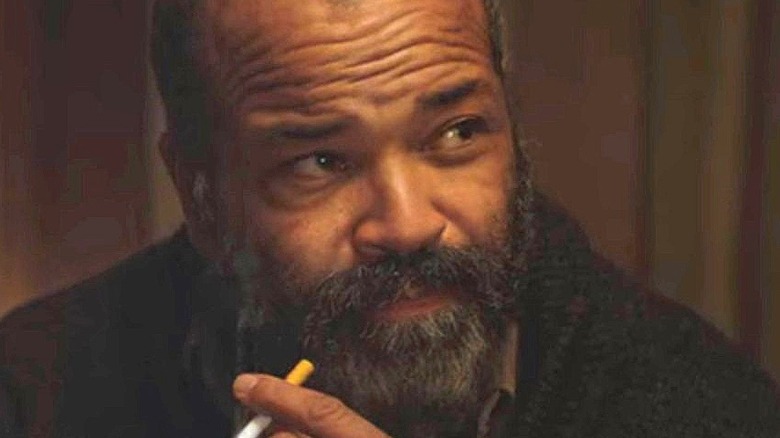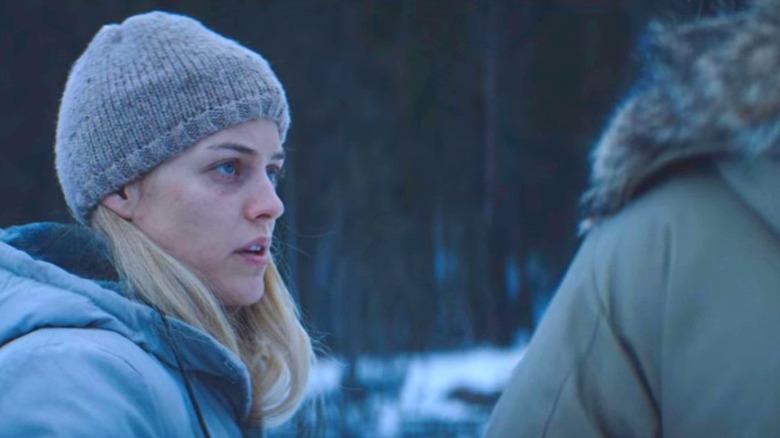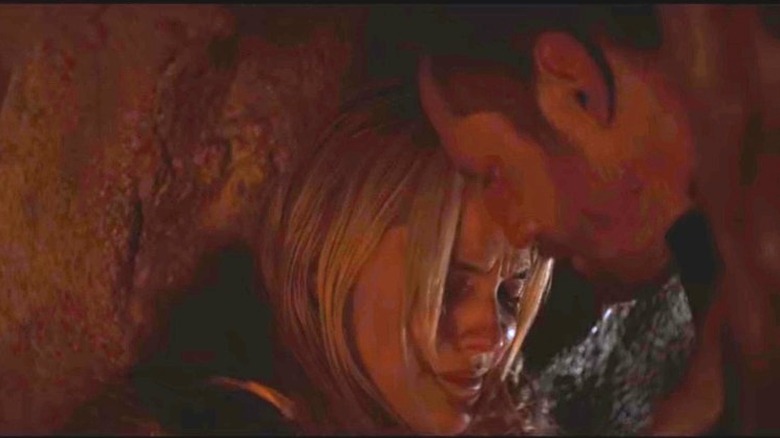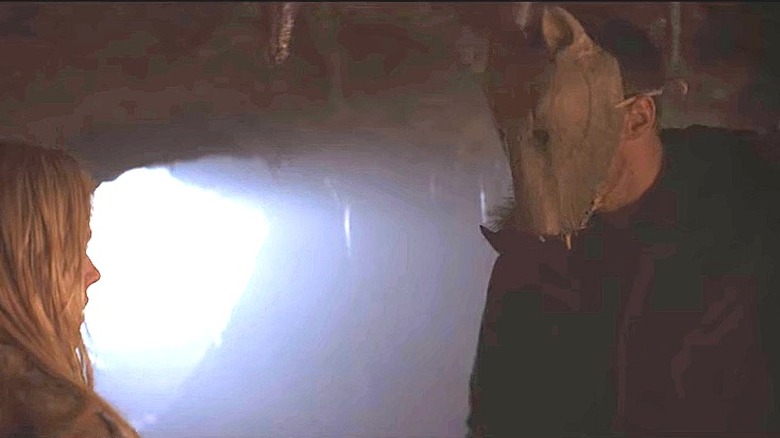The Ending Of Hold The Dark Explained
"Hold the Dark" is as cutthroat a thriller as they come. The 2018 Netflix film based on the novel of the same name by William Giraldi tells the story of a writer/wolf expert who is hired to investigate the disappearance of a missing child, only for more savage secrets to be revealed. With an A-list cast that includes Jeffrey Wright, Alexander Skarsgård, James Badge Dale, and Riley Keough and directed by Jeremy Saulnier ("Green Room," "Blue Ruin"), "Hold the Dark" makes for a gnarly watch that holds nothing back in delivering a harrowing viewing experience. Critics and audiences were split on the film, with a 71% critic's score and a 32% audience score on Rotten Tomatoes. While positive reviews abounded from such sources as The Austin Chronicle and AV Club, others, such as Associated Press were less kind, finding that it didn't live up to its full potential.
Admittedly, "Hold the Dark" is far from an easy-to-digest venture. Chock full of metaphors and slow-burn pacing, it's not the easiest film to decipher, especially on first viewing. To top it all off, the ending itself chooses to stay ambiguous, leaving many viewers in the dark. But now it's time to shine a light on "Hold the Dark ” and its ending to give you a better understanding of this one-of-a-kind film.
Protecting those you love
Russell Core (Jeffrey Wright) first comes to the fictional town of Keelut, Alaska to hunt down the wolves that are blamed for the disappearance of several children, including the six-year-old son of Medora Slone (Riley Keough). When Core goes to investigate a nearby wolf pack, he spots them chowing down on a wolf cub of their own. He explains this later as a behavior wolves will do when trying to weed out weaklings or if unnatural stressors are present in their environment.
We also learn that Medora may not have the most stable mindset. At one point, she tries to get Russell to put his hands around her neck while he's sleeping and wears a bizarre, wolf-looking mask at times (more on that later). We later discover that it was Medora who killed her child seemingly as an act to bring her husband, Vernon (Alexander Skarsgård), back from the Iraq war.
In a flashback scene, we see Vernon talking with their son, Bailey (Beckam Crawford) after having killed a deer. He tells him that it isn't bad to kill when you have to in order to protect the things you love. What he essentially illustrates here could be applied to what Medora has done, but did she truly kill her son out of this need to protect him from something worse, or is she simply an unstable person? This dichotomy of an inner desire to do what's right versus an outer viewpoint of committing horrible acts for the pleasure of it makes for the film's greatest inner conflict, which drives much of the later action.
Two lone wolves, closer than ever before
Possibly the film's biggest plot twist is what we learn about the true nature of Medora and Vernon's relationship. While never explicitly stated, it is heavily implied that the two are actually siblings, meaning that their relationship is incestuous. This is implied by several elements, including an old photo that shows the two in a family setting, Medora mentioning how she never "met" Vernon but always knew him, and a scene where a Native American hunter points out the similarities in their appearances. Although kept somewhat murky in the film, the original book leaves nothing to the imagination, stating clearly that the two are twin siblings and have an incestuous connection.
From here, we can possibly pick up why Medora killed her son. Paralleling the wolves killing the weaker cub earlier on, Medora kills Bailey as she considers him to be unnatural in how he came into the world. On top of that, with her being mentally unstable and Vernon going on a killing spree around the town, it's possible that she is trying to save him from growing up in such a home. As savage as it sounds, it ultimately helps reveal what the film is trying to say at its core.
Holding in the dark
Remember when we talked about those wolf masks that Medora was wearing? The mask not only belongs to Medora, but Vernon has one as well. At the end, after having nearly fatally shot Russell with a spear, Vernon reconnects with Medora and attempts to strangle her similar to how she tried making Russell do to her. He stops after she removes her mask, and from there, it seems the couple has somewhat reconciled. He takes the spear out of Russell and the two make it out to the wilderness, where they unearth their son's coffin and take it with them into the woods.
The ending can be seen in either a literal or metaphorical light. It can be seen as the two trying to move on from their dark deeds and going together to properly bury their son, of course. But the wolf masks could be implying something more mystically, possibly that the two have been taken over by the essence or spirit of a wolf somehow and now see themselves as such. And with their departure with the coffin, you wonder what they plan to do with it now. Will they try bringing back their son somehow? Will they try reverting him to their ways? Either way, this is the "dark" that they have been holding onto for so long. They don't need to hide this side of themselves anymore, finally giving in to the animalistic tendencies that have been eating away from them for who-knows-how-long.



